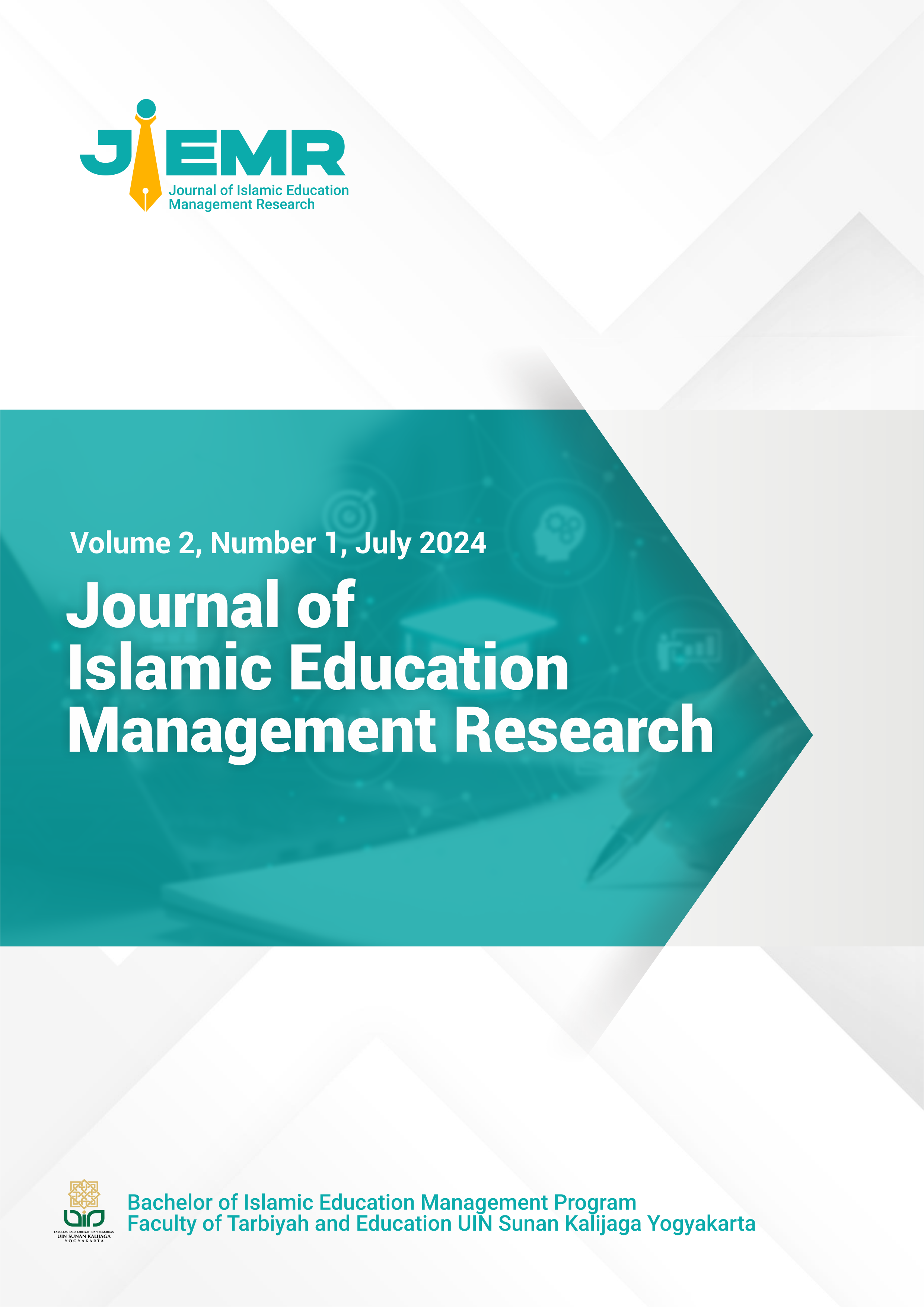The Role of the Islamic Education Section in Enhancing Student Academic Performance in Yogyakarta
DOI:
https://doi.org/10.14421/jiemr.2024.21-06Keywords:
Academic Performance, Holistic Development, Islamic Education Section, the Ministry of Religious Affairs in Yogyakarta CityAbstract
Purpose – This study investigates the role of the Islamic Education Section of the Ministry of Religious Affairs in Yogyakarta in improving student academic performance.
Design/methods – Employing a qualitative case study approach, data were collected through observations, interviews, and documentation from key informants, main informants, and supporting informants involved with the Islamic Education Section.
Findings – The findings reveal that the Section significantly contributes to academic achievements through comprehensive services, guidance, and activities such as Musabaqah Tilawatil Qur’an (MTQ) and the Islamic Education Skills and Arts Week (Pentas PAI). These programs enhance students' interest, talents, and understanding of Islamic principles, fostering balanced development.
Research implications/limitations – The study's scope is limited to Yogyakarta, and the primary reliance on qualitative data may limit the generalizability of the findings. Further research could include a broader range of regions and employ mixed-method approaches to validate and expand upon these results.
Practical implications – Educational policymakers should consider integrating religious education with mainstream academic curricula to foster holistic student development. The success of the MTQ and Pentas PAI programs underscores the potential of such integrated educational approaches in promoting academic and moral growth.
Originality/value – This study highlights the crucial role of religious education in nurturing well-rounded individuals and offers a model that can be adapted and implemented in various educational systems to enhance student outcomes holistically.
References
Abuhassna, H., Busalim, A., Yahaya, N., Zakaria, M. A. Z. M., & Latif, A. B. A. (2023). Study from Home! The Antecedents and Consequences of Collaborative Learning on Malaysian University Students. Journal of Information Technology Education: Research, 22, 71–95. Scopus. https://doi.org/10.28945/5074
Arfa, A. M., & Lasaiba, D. (2023). Pelatihan dan Pembimbingan Khat Al-Qur’an Sebagai Upaya Meningkatkan Kemampuan Siswa Dalam Mengikuti MTQ Provinsi Maluku. Jurnal Pengabdian Kepada Masyarakat Arumbai, 1(1), 70–80.
Azeem, K., & Zubair, A. (2021). Role of academic self-handicapping and self-regulated learning strategies in mastery goal orientation among adolescents. FWU Journal of Social Sciences, 15(2), 152–172. Scopus. https://doi.org/10.51709/19951272/Summer-2/9
Bastomi, H. (2020). Pemetaan Masalah Belajar Siswa SMK Negeri 3 Yogyakarta Dan Penyelesaiannya (Tinjauan Srata Kelas). KONSELING EDUKASI “Journal of Guidance and Counseling,” 4(1), 35–55. https://doi.org/10.21043/konseling.v4i1.7418
Faizah, I. N., Lestari, L. L., Hidayat, S., & Mustofa, A. (2020). Etos Kerja dalam Budaya Organisasi di Kantor Kementerian Agama Kabupaten Gresik. Jurnal Administrasi Pendidikan Islam, 2(1), 1–16. https://doi.org/10.15642/japi.2020.2.1.1-16
Ghozali, M. (2022). Manajemen Bimbingan Islam Terhadap Peserta MTQ (Musabaqoh Tilawatil Qur’an) Kabupaten Bangka Tengah. Taklimuna: Journal of Ecucation and Teaching, 1(2), 65–72.
Hasan, A. R. (2019). Pendidikan Karakter Bersaing dalam Musabaqah Tilawatil Qur’an. IQ (Ilmu Al-Qur’an): Jurnal Pendidikan Islam, 2(02), 202–216. https://doi.org/10.37542/iq.v2i02.33
Millah, N. I. A. Q., & Maghfuri, A. (2019). Peran Kantor Kementerian Agama Kota Yogyakarta dalam Kebijakan Pengembangan Pendidikan Islam. IQ (Ilmu Al-Qur’an): Jurnal Pendidikan Islam, 2(02), 130–148.
Misbah, M. N. R. (2021). Implementasi Program Moderasi Beragama yang Dicanangkan oleh Kementerian Agama Kabupaten Banyumas di Lingkungan Sekolah. Lectura: Jurnal Pendidikan, 12(2), 230–245. https://doi.org/10.51620/0869-2084-2021-66-8-465-471
Moleong, L. J. (2001). Metodologi Penelitian Kualitatif. PT Remaja Rosdakarya.
Mulyawan Arif, & Santosa Sedya, M. I. (2023). Evaluasi Program Pendidikan Islam Terpadu Dalam Upaya Meningkatkan Spiritualitas di Home Schooling Aksara Salam Institute. Pendas: Jurnal Ilmiah Pendidikan Dasar, 08(03), 327–352.
Nyatuka, B. O. (2022). Family-community-higher education partnership: A critical pillar in realizing social justice. In Res. Anthology on Balancing Family-teach. Partnersh. For Stud. Success (pp. 288–307). IGI Global; Scopus. https://doi.org/10.4018/978-1-6684-7601-7.ch014
Purba, R., Thao, N. V., & Purba, A. (2020). Using genre-based approach to overcome students’ difficulties in writing. Journal of Education and E-Learning Research, 7(4), 464–470. Scopus. https://doi.org/10.20448/JOURNAL.509.2020.74.464.470
Santos, L. M. D. (2022). Learning taekwondo martial arts lessons online: The perspectives of social cognitive career and motivation theory. International Journal of Instruction, 15(1), 1065–1080. Scopus. https://doi.org/10.29333/iji.2022.15160a
Somad, M. A. (2021). Pentingnya Pendidikan Agama Islam dalam Membentuk Karakter Anak. QALAMUNA: Jurnal Pendidikan, Sosial, Dan Agama, 13(2), 171–186. https://doi.org/10.37680/qalamuna.v13i2.882
Sugiyono, D. (2013). Metode Penelitian Kuantitatif, Kualitatif, dan R&D. Alfabeta.
Wardoyo, C., Satrio, Y. D., Narmaditya, B. S., & Wibowo, A. (2021). Do technological knowledge and game-based learning promote students achievement: Lesson from Indonesia. Heliyon, 7(11). Scopus. https://doi.org/10.1016/j.heliyon.2021.e08467
Zhang, Y., Dang, Y., He, Y., Ma, X., & Wang, L. (2021). Is private supplementary tutoring effective? A longitudinally detailed analysis of private tutoring quality in China. Asia Pacific Education Review, 22(2), 239–259. Scopus. https://doi.org/10.1007/s12564-021-09671-3bogor.ac.id/index.php/EDUCATE/article/view/1687
Downloads
Published
Versions
- 2024-07-01 (2)
- 2024-06-23 (1)
Issue
Section
License
Copyright (c) 2024 Muhammad Ulil Abshor, Via Rahmah

This work is licensed under a Creative Commons Attribution-NonCommercial-ShareAlike 4.0 International License.
Copyright Notice
Authors who publish with this journal agree to the following terms:
- Authors retain copyright and grant the journal right of first publication with the work simultaneously licensed under a Creative Commons Attribution-ShareAlike 4.0 International License that allows others to copy and redistribute the material in any medium or format with an acknowledgement of the work's authorship and initial publication in this journal and also allows to remix, transform, and build upon the material for any purpose, even commercially with contributions under the same license as the original.
- Authors are able to enter into separate, additional contractual arrangements for the non-exclusive distribution of the journal's published version of the work (e.g., post it to an institutional repository or publish it in a book), with an acknowledgement of its initial publication in this journal.
- Authors are permitted and encouraged to post their work online (e.g., in institutional repositories or on their website) prior to and during the submission process, as it can lead to productive exchanges, as well as earlier and greater citation of published work.









